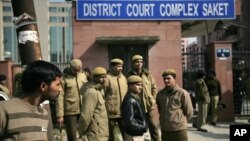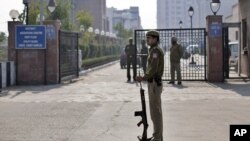NEW DELHI —
Five suspects accused in the brutal gang rape in India's capital arrived in a fast-track court for the start of their trial. The proceedings begin a day after a government panel issued recommendations to overhaul the Indian justice system's handling of crimes against women.
Unlike their previous court appearances, the start of the suspects' trial for rape and murder began quietly in New Delhi and with little media coverage, since the proceedings were closed to the public.
2013
Six men, including a juvenile, are accused of brutally beating and gang raping a student after she boarded a bus in the Indian capital with a male friend on December 16. The 23-year-old woman was later flown to a Singapore hospital for treatment and died two weeks later after sustaining massive internal injuries.
The fact prosecutors could present their arguments Thursday, so soon after the attack, is a first in a country where it can take years for criminal acts to be prosecuted. The fast-track court was created directly in response to what many here see is a failure in the country's justice system.
Sudha Sundaraman is with the All India Democratic Women's Association.
"It has followed upon a case that has galvanized the whole nation, raised the public conscience, said Sudha. "And I do believe that the government has to therefore listen to the voice and the concerns."
A government-appointed panel issued a scathing report Wednesday highlighting the system's failure to enforce laws that protect women from violence and harassment.
Acting upon thousands of suggestions from the public and rights activists, the commission called on police to register each and every rape case and said such trials should be held in a speedy manner. The panel also suggested that stalking, voyeurism and other forms of sexual harassment be punishable with prison terms.
While activist Sundaraman praised the panel report as a step in the right direction, she acknowledged that true change must come from society as a whole and that she must rely on her own instincts to ensure her safety.
"If it is night, and if I am returning say from somewhere late in the night by train, then I find that I do not feel so secure," Sundaraman said.
It is a sentiment shared by many women here in India's capital, who hope that some change can come from such a horrific tragedy.
Unlike their previous court appearances, the start of the suspects' trial for rape and murder began quietly in New Delhi and with little media coverage, since the proceedings were closed to the public.
Brutal Gang Rape Shocks India
Brutal Gang Rape Shocks India
2012
- December 16: Victim is gang-raped and beaten on a bus in New Delhi
- December 20: Protests intensify and spread
- December 29: Victim dies in Singapore hospital
2013
- January 2: Five suspects charged with rape and murder
- January 17: Case against five suspects sent to special fast-track court
- January 23: Government panel calls for new sexual assault laws
- January 28: Panel rules sixth suspect will be tried as a juvenile
- February 2: The five accused being tried in the fast-track court plead not guilty
- March 11: Indian police say one of the suspects killed himself in jail
- August 31: Juvenile suspect found guilty
- September 10: Remaining four suspects found guilty
The fact prosecutors could present their arguments Thursday, so soon after the attack, is a first in a country where it can take years for criminal acts to be prosecuted. The fast-track court was created directly in response to what many here see is a failure in the country's justice system.
Sudha Sundaraman is with the All India Democratic Women's Association.
"It has followed upon a case that has galvanized the whole nation, raised the public conscience, said Sudha. "And I do believe that the government has to therefore listen to the voice and the concerns."
India's New Fast-Track Court
India's New Fast-Track Court- Inaugurated January 2, 2013 by India's chief justice
- Will try sexual offense cases against women
- Will hear cases on a daily basis
- Is the first of five fast-track courts that will deal with rape
- Located in the district court complex in New Delhi
Acting upon thousands of suggestions from the public and rights activists, the commission called on police to register each and every rape case and said such trials should be held in a speedy manner. The panel also suggested that stalking, voyeurism and other forms of sexual harassment be punishable with prison terms.
While activist Sundaraman praised the panel report as a step in the right direction, she acknowledged that true change must come from society as a whole and that she must rely on her own instincts to ensure her safety.
"If it is night, and if I am returning say from somewhere late in the night by train, then I find that I do not feel so secure," Sundaraman said.
It is a sentiment shared by many women here in India's capital, who hope that some change can come from such a horrific tragedy.









